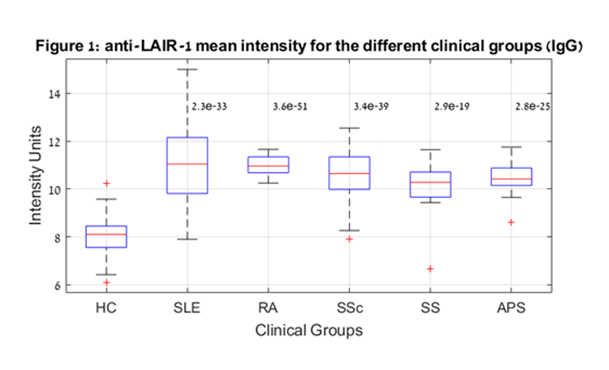Session Information
Session Type: ACR Poster Session B
Session Time: 9:00AM-11:00AM
Background/Purpose:
Current serological tests are not sufficiently accurate in differentiating between HC and those with autoimmune rheumatic diseases. We developed the iCHIP antigen microarray to provide extensive autoantibody profiling in human serum. We previously described the SLE-Key Rule-Out test, which distinguishes SLE patients from HC with 94% sensitivity, 75% specificity, and a negative predictive value (NPV) of 93%1,2,3. Here, we report the use of the autoimmune discovery iCHIP to distinguish between HC and subjects with SLE, RA, SSc, SS, and the APS.
Methods:
We examined IgM and IgG autoantibodies binding to 519 antigens (1038 features) in the sera of HC subjects (N=136), and in patients with SLE (N=30), RA (N=30), SSc (N=40), SS (N=20), and APS (N=16). FDR-adjusted p-values were calculated for each univariate test. Three independent multivariate classification methods were applied: Support Vector Machine (SVM), Quadratic Discriminant Analysis (QDA) and Naive Bayesian classifier (NB). Classifier training and testing were performed based on 10-fold cross validation on all samples, and the performance of each classifier was determined.
Results:
Univariate analysis revealed multiple statistically significant separating reactivities. We found that IgG autoantibody reactivity to the connective tissue antigen receptor leukocyte-associated immunoglobulin-like receptor 1 (LAIR-1) differentiated HC subjects with all of the 5 diseases with a p value of 2.8E-63. Other highly significant autoantigen reactivities included connective tissue proteins such as collagen III (p = 6.5E-26 (IgM)) and collagen II (p = 5E-22 (IgG)). Figure 1 shows anti-LAIR-1 data comparing HC subjects to each of the 5 diseases; each of the three classification methods differentiated between HC and subjects with autoimmune diseases. The typical mean classifier performance was 93% sensitivity, 96% specificity, and 95% accuracy. Interestingly, LAIR-1 appears to function as a “checkpoint” down-regulator of immune reactivity4 ; thus, it is possible that anti- LAIR-1 represent a target for therapeutic discovery and also may be pathogenic, and predispose to a variety of autoimmune conditions.
Conclusion:
Autoantibody specificities detected by the autoimmune discovery iCHIP successfully distinguished between HC individuals and individuals with several autoimmune rheumatic diseases, including SLE, RA, SSc, SS, and APS. These preliminary results are based on relatively small numbers of serum samples, but are very promising and warrant additional validation in larger cohorts of autoimmune and HC subjects.
References: 1Putterman et al; J Immunol Methods 2016 2Cohen IR, LOA 2016 3Massenburg et al; LOA 2017 4Tang et al; J Immunol 2012
Acknowledgements: Authors wish to acknowledge Cohen-Gindi O, Lerner M, Tarnapolski O, Blumenstein Y, Javaherian A, Pitts J, Barton M and Wong E
To cite this abstract in AMA style:
Putterman C, Gabrielli A, Balbir-Gurman A, Safer P, Jakobi-Brook K, Sorek R, Gluzman I, Wallace S, Cohen IR. The Autoimmune Discovery Ichip Distinguishes Healthy Individuals (HC) from Those with SLE, Rheumatoid Arthritis (RA), Scleroderma (SSc), Sjogren’s Syndrome (SS), and the Anti-Phospholipid Syndrome (APS) [abstract]. Arthritis Rheumatol. 2017; 69 (suppl 10). https://acrabstracts.org/abstract/the-autoimmune-discovery-ichip-distinguishes-healthy-individuals-hc-from-those-with-sle-rheumatoid-arthritis-ra-scleroderma-ssc-sjogrens-syndrome-ss-and-the-anti-phospholipid-synd/. Accessed .« Back to 2017 ACR/ARHP Annual Meeting
ACR Meeting Abstracts - https://acrabstracts.org/abstract/the-autoimmune-discovery-ichip-distinguishes-healthy-individuals-hc-from-those-with-sle-rheumatoid-arthritis-ra-scleroderma-ssc-sjogrens-syndrome-ss-and-the-anti-phospholipid-synd/

